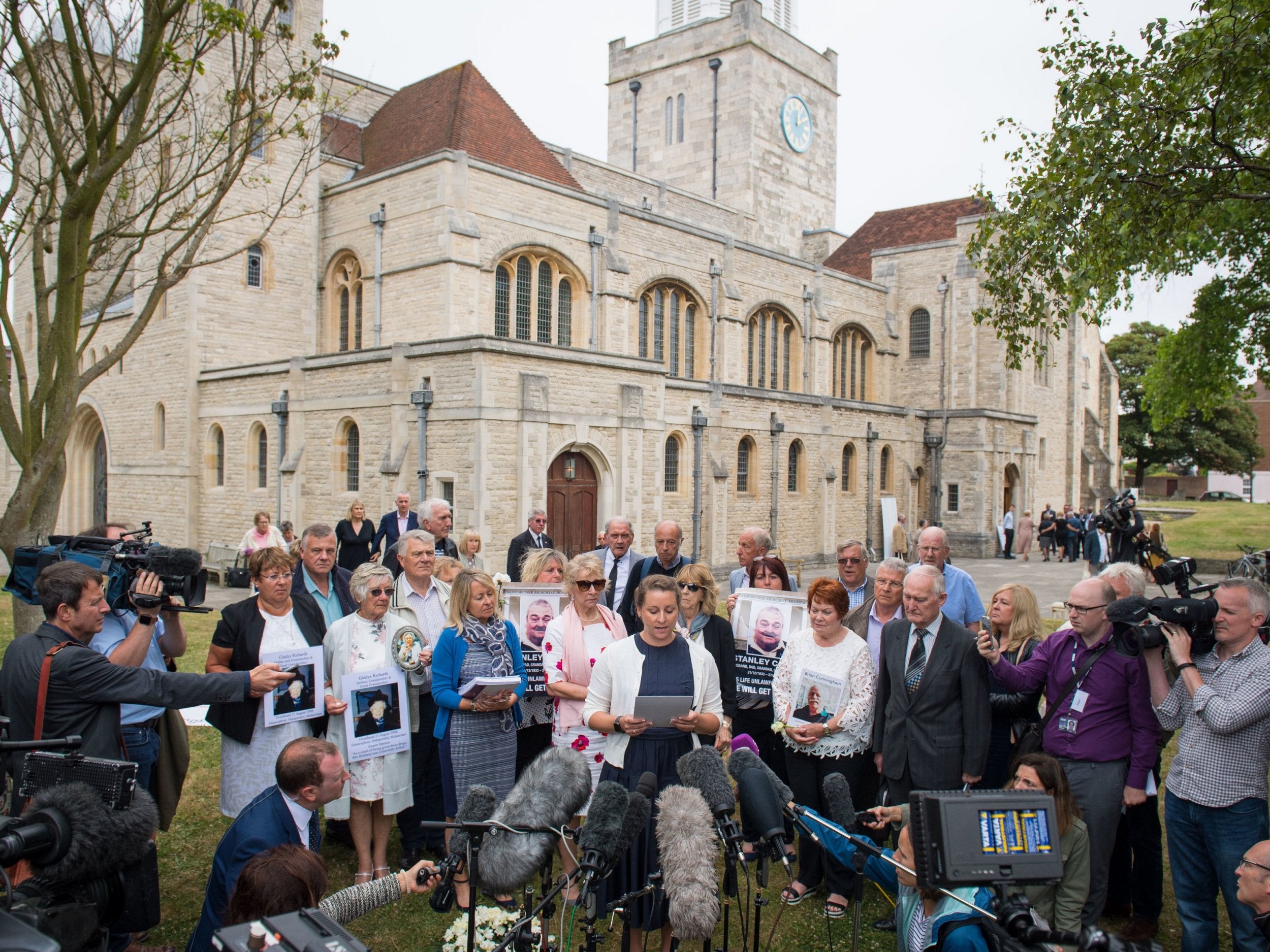Gosport hospital scandal: Anger at government’s broken promise to meet relatives of hundreds who died
Exclusive ‘It’s like everyone is getting on with their lives and the families haven’t been communicated with at all,’ says Bridget Reeves on the anniversary of her grandmother’s death at Gosport

Your support helps us to tell the story
From reproductive rights to climate change to Big Tech, The Independent is on the ground when the story is developing. Whether it's investigating the financials of Elon Musk's pro-Trump PAC or producing our latest documentary, 'The A Word', which shines a light on the American women fighting for reproductive rights, we know how important it is to parse out the facts from the messaging.
At such a critical moment in US history, we need reporters on the ground. Your donation allows us to keep sending journalists to speak to both sides of the story.
The Independent is trusted by Americans across the entire political spectrum. And unlike many other quality news outlets, we choose not to lock Americans out of our reporting and analysis with paywalls. We believe quality journalism should be available to everyone, paid for by those who can afford it.
Your support makes all the difference.The government has still not met families whose loved ones were among as many as 650 patients revealed to have been killed with lethal doses of opiates at Gosport War Memorial Hospital.
In June, the then health secretary Jeremy Hunt told the Commons he would meet as many of the families as possible before the government responded to the damning findings of the Gosport Independent Panel.
But The Independent has learned the only contact in the past five months was a letter sent this week from Mr Hunt’s successor, Matt Hancock, which some families had still not received as he outlined the government’s next steps to MPs on Wednesday.
“I’m absolutely shocked that we haven’t even been told [about the response], it just goes to show how appalling it is,” Bridget Reeves, whose grandmother Elsie Devine was 88 when she died at Gosport on this date in November 1999.
“I’ve written to Theresa May, Norman Lamb, nobody has given us a meeting. We can’t understand it, it’s like everyone is getting on with their lives and the families haven’t been communicated with at all.”
Ms Reeves had not received a letter, though Gillian MacKenzie, who was the first person to go to the police about the death of her mother, Gladys Richards, said hers had arrived on Tuesday.
“Nobody seems to know what’s going on,” she told The Independent.
Shortly before he became home secretary Mr Hunt told the Commons: “My department will provide support for families from today, as the panel’s work has now concluded, and I intend to meet as many of the families as I can before we give our detailed response in the autumn.”
The families have been calling for criminal charges to be brought in the wake of the review, which was chaired by the former bishop of Liverpool James Jones.
In particular they want former GP Dr Jane Barton to face criminal investigation after the report found she was principally responsible for the “institutionalised culture of shortening lives” that prevailed on the wards.
“I swear, until the blood runs out of my body, I cannot give up on this,” said Ms Reeves, who acts as spokesperson for the group.
In his speech on Wednesday, Mr Hancock paid tribute to their fight for the truth, but focused on changes to prevent patient safety issues being covered up in future.
The government has already introduced new protections for whistleblowers and pledged a new medical investigator role to ensure every death where families have concerns is reviewed.
Mr Hancock also pledged a review of medicines safety oversight in hospital and new legislation to compel trusts to publish an annual report on how staff whistleblowing concerns have been addressed.
However on the findings of the report that concluded 456 patients had died from prescribing at Gosport, alongside “probably at least 200 others” who couldn’t be confirmed, he said it was a matter for the police.
“[Police] must be allowed to complete that process and to follow the evidence so justice can be done,” he told MPs.
“The process currently under way is the reviewing of all evidence to ask what and whether prosecutions should be brought forward, that will continue into the new year. Then the police will make a statement.”
The review found serious failings with the three separate investigations led by Hampshire police, which wrote off family members who first raised concerns in the 1990s as “troublemakers”.
The force has “stepped back” from the ongoing investigation which is now being led by Kent and Essex Police assistant chief constable Nick Downing. Following the assessment period the force will decide whether a further review is needed, or criminal charges should be brought.
The families had already planned a protest outside Downing Street on Saturday against the silence and inaction of police and ministers.
Ms Reeves called for the public to get behind the campaign and said they feared the report was another “paper exercise” that would grind to a halt before families saw justice.
Matt Hancock said in a statement: “The changes we have made since Gosport mean staff can speak up with more confidence, failings are identified earlier and responded to quicker.
“The reforms we plan to make will mean greater transparency, stricter control of drugs, and a full and thorough investigation of every hospital death. Taken together it means that warning signs will be spotted earlier and examined at the time, not 25 years later.”
The Department of Health and Social Care was approached for comment about when it would meet the families.
Join our commenting forum
Join thought-provoking conversations, follow other Independent readers and see their replies
Comments